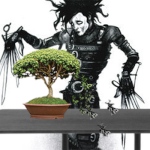Taproot and trees from cuttings
4 posters
Page 1 of 1
 Taproot and trees from cuttings
Taproot and trees from cuttings
I have a few novice questions. My understanding is that trees grown from cuttings don't develop a taproot. Has that been your experience? Also, have you found that trees grown from cuttings do not develop a good nebari?
Last edited by Barry M on Thu Jul 26, 2012 10:01 pm; edited 1 time in total
Barry M- Member
 Re: Taproot and trees from cuttings
Re: Taproot and trees from cuttings
Cuttings normally do not develop a taproot so they should have good nebari if done and trained properly. Using the tile method (you can use plastic, plywood, etc. as well) helps.

Poink88- Member
 Re: Taproot and trees from cuttings
Re: Taproot and trees from cuttings
Hi,
you are right - often a tree grown from a cutting will have one sided rooting. Many cuttings use a heel or angled cut and the roots develop from one place or on one side so the tree will have the very common problem of sections of trunk with no roots. My hinoki has fantastic roots one way while the trunk goes straight into the soil on the opposite side because it was a cutting - but this is a million times better than a graft in many cases !! and the roots are used to enhance the direction of the branches so sometimes you have to use what the tree gives you (and hide the rest!
and the roots are used to enhance the direction of the branches so sometimes you have to use what the tree gives you (and hide the rest!  )
)
To be honest totally radial roots are not always convincing or that natural on every tree - on a broom or fully branched deciduous tree roots going all round work well, but leaning, cascading, rugged conifers etc look wrong with a perfect circle of roots so don't worry too much.
While you dont get a true tap root you will get one or two dominant strong roots from a cutting so you still need to keep these cut so a finer root pad develops under the trunk.
dont dismiss cuttings though - a great way to get lots of material to practice on, but air layers will give you better, thicker trunks to work with much quicker.
cheers Marcus
you are right - often a tree grown from a cutting will have one sided rooting. Many cuttings use a heel or angled cut and the roots develop from one place or on one side so the tree will have the very common problem of sections of trunk with no roots. My hinoki has fantastic roots one way while the trunk goes straight into the soil on the opposite side because it was a cutting - but this is a million times better than a graft in many cases !!
To be honest totally radial roots are not always convincing or that natural on every tree - on a broom or fully branched deciduous tree roots going all round work well, but leaning, cascading, rugged conifers etc look wrong with a perfect circle of roots so don't worry too much.
While you dont get a true tap root you will get one or two dominant strong roots from a cutting so you still need to keep these cut so a finer root pad develops under the trunk.
dont dismiss cuttings though - a great way to get lots of material to practice on, but air layers will give you better, thicker trunks to work with much quicker.
cheers Marcus

marcus watts- Member
 Re: Taproot and trees from cuttings
Re: Taproot and trees from cuttings
Sorry Marcus but I disagree.marcus watts wrote:you are right - often a tree grown from a cutting will have one sided rooting. Many cuttings use a heel or angled cut and the roots develop from one place or on one side so the tree will have the very common problem of sections of trunk with no roots.
Not sure if it is because I use larger branches for my cuttings, usually close to 1" or larger (2"+ I think is my largest)...otherwise, I usually do not think it is worth my time to do cuttings (unless it is a really rare plant for me). I cut perpendicular or diagonal to the branch but add zig-zag notches at the cut edge bark.
I also control the dominant root when I repot (plus the tile method) so no "taproot" develops.

Poink88- Member
 Re: Taproot and trees from cuttings
Re: Taproot and trees from cuttings
thats ok Dario
1-2" thick cuttings..!!.......very limited number of species that root from those in Europe, and usually trees that make 100's of roots easily from all round the trunk anyway.
Most of the desirable and worthwhile species need a younger, thinner cutting and they root irregularly most of the time. My main job at Hilliers years ago was keeping the girls in the cutting shed supplied with material for cuttings from the arboretum. They were doing well over 10,000 a week so we had a fair few cuttings to deal with each year, and it is clear to see in the finished plants how the roots formed.
I think every bonsai grower who has cleaned back the soil from a garden center plant looking for a great nebari will know radial perfection doesnt happen often - 99% of the time they have one sided rootage. Remember we are giving general advice on cuttings for potential bonsai material, so taking 1-2" thick cuttings and expecting perfect radial root flare is not representative of what will happen the bulk of the time.
Your trees from big cuttings sound good though - stick some pics up if the surface roots are visible,
Cheers Marcus
1-2" thick cuttings..!!.......very limited number of species that root from those in Europe, and usually trees that make 100's of roots easily from all round the trunk anyway.
Most of the desirable and worthwhile species need a younger, thinner cutting and they root irregularly most of the time. My main job at Hilliers years ago was keeping the girls in the cutting shed supplied with material for cuttings from the arboretum. They were doing well over 10,000 a week so we had a fair few cuttings to deal with each year, and it is clear to see in the finished plants how the roots formed.
I think every bonsai grower who has cleaned back the soil from a garden center plant looking for a great nebari will know radial perfection doesnt happen often - 99% of the time they have one sided rootage. Remember we are giving general advice on cuttings for potential bonsai material, so taking 1-2" thick cuttings and expecting perfect radial root flare is not representative of what will happen the bulk of the time.
Your trees from big cuttings sound good though - stick some pics up if the surface roots are visible,
Cheers Marcus

marcus watts- Member
 Re: Taproot and trees from cuttings
Re: Taproot and trees from cuttings
As soon as I can disturb them again, I will take pics and post. I usually take them from my newly dug trees that need to be thinned/pruned hard (I do listen you knowmarcus watts wrote:Your trees from big cuttings sound good though - stick some pics up if the surface roots are visible.
The biggest ones are crabapple and ilex vomitoria (yaupon holly) and some of the boxwood 1" to 1-1/2" have taken also.

Poink88- Member
 Re: Taproot and trees from cuttings
Re: Taproot and trees from cuttings
Barry,
it depends on the type of tree/shrub,and remember with some you can make the root into the tree.
I suggest you just experiment.
Additionally in nature not all trees/shrubs will show surface roots. Just observe.
Later.
Khaimraj
it depends on the type of tree/shrub,and remember with some you can make the root into the tree.
I suggest you just experiment.
Additionally in nature not all trees/shrubs will show surface roots. Just observe.
Later.
Khaimraj

Khaimraj Seepersad- Member
 Similar topics
Similar topics» Who does cuttings?
» Monster Yamadori Hawthorn Taproot Treatment
» how do I turn young trees in to bonsai trees? I have about 20 maple trees all about 3 weeks old and want to grow them into bonsai trees.
» Beech cuttings?
» Help with cuttings
» Monster Yamadori Hawthorn Taproot Treatment
» how do I turn young trees in to bonsai trees? I have about 20 maple trees all about 3 weeks old and want to grow them into bonsai trees.
» Beech cuttings?
» Help with cuttings
Page 1 of 1
Permissions in this forum:
You cannot reply to topics in this forum






